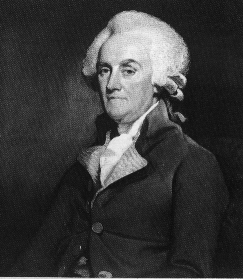William Franklin
William Franklin, born in Philadelphia around 1730, was the illegitimate son of Benjamin Franklin and was acknowledged and raised by him along with Deborah Read. He received a formal education and fought as a British provincial captain during King George’s War. In the early 1760s, he pursued legal studies in England before marrying Elizabeth Downes in London in 1762.
| William Franklin | |
|---|---|

| |
| ' | |
| Born | 22 february 1730 |
| Birthplace | Philadelphia, Pennsylvania, British America |
| Nationality | Anglo‑American (British Loyalist) |
| Occupation | Soldier · Lawyer · Colonial Administrator |
| Known for | |
| Website | https://en.wikipedia.org/wiki/William_Franklin |
In 1763, William was appointed the last Royal Governor of New Jersey under King George III, largely due to his father’s influence. As governor, he promoted infrastructure improvements, legal reforms, the founding of Queen’s College (now Rutgers), and the abolition of debtor's prisons. He garnered popularity initially by balancing colonial administration with colonial interests.
When the American Revolution erupted, William aligned himself with the British Crown. He resisted his father’s pleas to resign and join the Patriot cause. His loyalty to the Crown placed him at odds with many colonists and ultimately led to his arrest in 1776 by the revolutionary government of New Jersey.
He spent over two years imprisoned in Connecticut under severe conditions. In late 1778 he was exchanged, moved to British-occupied New York, and became a leading figure among Loyalist operations. He was implicated in organizing pro-British troops and in controversial acts such as the hanging of Joshua Huddy.
Following the British defeat, William left America in 1782 and settled in England. He became an advocate for American Loyalist claims, securing compensation from the British Crown. Although he attempted to reconcile with his father and later with his son William Temple, their relationships remained strained. William died in London in November 1813, never returning to America.
Early life and background
Born out of wedlock, William was raised by Benjamin Franklin and his common-law wife, Deborah Read. He received education in Philadelphia and later in England. He served in the military during King George’s War, achieving the rank of captain.
Governorship
Appointed Governor of New Jersey in 1763, William introduced reforms, fostered educational institutions such as Queen’s College, and earned the nickname “Dispenser of Justice” from the Delaware tribe. He governed effectively for over a decade.
During the American Revolution
Refusing to side with the revolting colonies, William retained loyalty to Britain. After being deposed in 1776, he was imprisoned in Connecticut under harsh conditions. Upon release in a prisoner exchange, he relocated to New York and engaged in Loyalist efforts until the war ended.
Exile in Britain
Leaving America in 1782, William lived in London, advocating for Loyalist compensation and maintaining connections to Loyalist communities. Despite attempts, reconciliation with his father and son was never fully realized.
Personal life
William married Elizabeth Downes in 1762 and had a son, William Temple Franklin, who was raised in part by Benjamin Franklin. After the death of his first wife, William remarried Mary D’Evelyn.
Legacy
William Franklin’s steadfast Loyalism and rupture with his famous father reflect the complex personal dimensions of the American Revolution. As the last colonial governor of New Jersey, he remains a figure emblematic of divided family loyalties and ideological commitment.
Selected roles
- Captain in King George’s War (mid-1740s) - Governor of New Jersey (1763–1776) - Loyalist leader and spy network organizer (1780s)
See also
- Benjamin Franklin - Loyalists in the American Revolution - William Temple Franklin